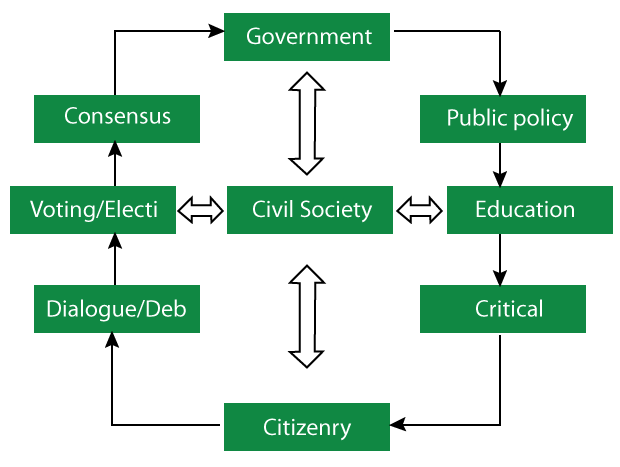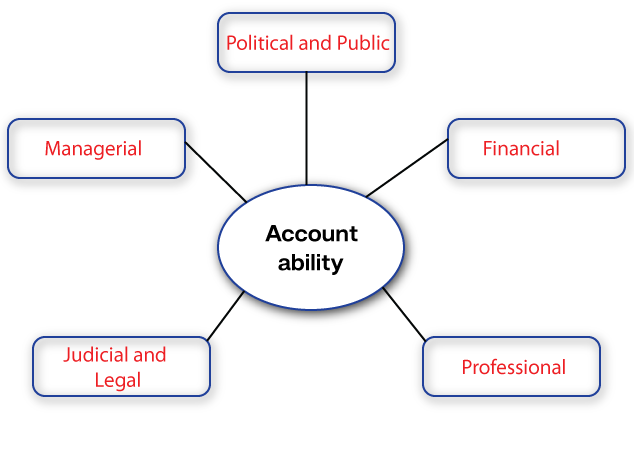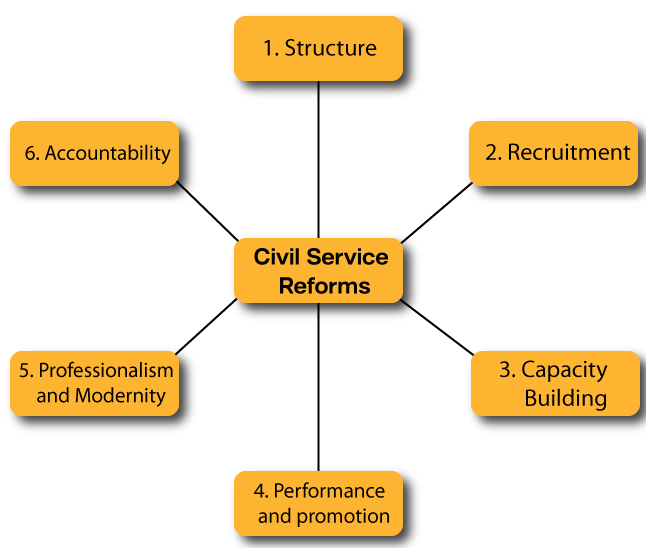Paper – II
(Governance, Constitution, Polity, Social Justice and International relations)
India is a democratic country and in this system, power confers with the people. The power is exercised through its designated representatives who have the command to manage them for particular period. The civil services by quality of its knowledge, experience and understanding of public affairs support the chosen representatives to device effectual policy and have great responsibility to implement these policies for the welfare of society and enhancement of nation. Parliamentary democracies are generally pigeonholed by a permanent civil service which helps the political policymakers and political executives. India is a constitutional fairness and its operations are usually depends upon four supports that include Legislature, Executive, Judiciary, and Free Press. Each one of these has been assigned its role in democratic establishment. First pillar is associated with the governance of the State. Effective and efficient institutions form the strength of an efficacious development and governance process.
What is the purpose of the civil service exam?
One of the basic components of Indian governance planning is the concept of an unbiased, honest, efficient and valiant civil service which is the core of the Executive whether it is All India Services or the other Civil Services. They form the stable structure and support of Indian Administration System.
Importance of Civil Services Exams
Civil society of nation 
The civil service is a subdivision of government which is usually grouped with the Executive, and without which governments cannot function. These are men and women who establish the permanent staff of the departments of governments. They are expert administrators. Some academicians refer jointly to these employees as public administration or the bureaucracy, or public service. Olaopa (2008) stated that civil service, although commonly used, is usually misinterpreted. According to Lawson, (1974), the civil service is the term used to designate servants of the state or the central government employed as civilians. It does not include ministers or cabinet members or the Judiciary. In some countries, it usually does not cover local government employees nor the staff of public enterprises. In this framework, the civil service will embrace civilian employees of state and federal governments only, excluding cabinet ministers and the judiciary. Idode, (1986), explained civil service as the “array of administrative and professional staff employed, on permanent and pensionable basis to established posts, by the state, to advise on and execute its policies.
Historical review of civil services: Civil service is described as the body of government officials who are recruited in civil administration that are neither political nor judicial. The public administration system in India has been established since ancient times. Therefore, the notion of civil service was predominant in India from earlier period in history. In the past era, the civil servants performed the role of servants of the king. The Mauryan administration employed civil servants in the name of adhyakshas and rajukas. The investigation for civil servants in those days too was very stringent as revealed by Kautilya’s Arthasastra. The expanse of the region and the need to hold it intact made it vital for the Mauryan administration to recruit civil servants based on excellence.
In the medieval period, civil servants became State Servants, who contributed their efforts in the development of land revenue system during the Moghul period. The East India Company has a civil service to perform their commercial functions. Afterward, during the British rule they started as servants to the Crown, but slowly they started becoming ‘Public Servants’. The British Government established the civil services basically with the aim of strengthening the British administration in India. In this period, the role of civil services was to promote the British interest and its role was totally regulatory. Later on, they assumed developmental roles also. After the coming into force of the Constitution of independent India, the civil services has modified considerably.
The modern history of the Indian Civil Service (ICS) began with the East India Company. In the period of 1800 AD, Lord Wellesley realised that the administrators of the Empire must be qualified, expertise, and character established the College of Fort William where every worker of the company was to be sent for a three-year course of education of the standards of the universities of Oxford and Cambridge. Among other subjects taught were ethics and international law, and in addition, Indian history and oriental languages. The Directors, however, while accepting the proposal decided that the college should be in England. This is how that, for a whole half-century and more, all members of the Civil Service were qualified and specially trained at the East India College at Haileybury. The method of employment was by competitive examination but the method of entry was by nomination of the Directors.
There is immense importance of the civil service system in the administrative system which acts as most vital tool for governance of India. In post-independent, India civil service was reorganised. There are three tiers of administration that include Union/Central Government, State Government, and Local Government. At the central level, the civil service include the All India Services, namely the Indian Administrative Service (IAS). Indian Foreign Service (IFS), Indian Forest Service (IFS), and Indian Police Service (IPS). Besides these, there are other Central Services such as the Indian Revenue Service, Indian Railways Service, etc. at central level. The State Governments have their own set of services like State Civil Service. Gradually, with time, the role of civil services has transformed that depend on the schedule of the governance of that specific period. During British period, enforcement of law and order and collection of revenue was major issue of civil services officers. After independence of India, when the Government has attained the role of Welfare State, civil services has imperative role in implementing national and state policies of welfare and planned development.
The importance of the civil service to the Indian administrative system develops from the following factors:
- Service presence throughout the country and its strong binding character.
- Non-partisan advice to political leadership in the midst of political instability and uncertainties.
- Effective policy-making and regulation.
- Effective coordination between institutions of governance.
- Leadership at different levels of administration.
- Service delivery at the cutting edge level.
- Provide “continuity and change” to the administration.
It has been observed that civil services are considered as main component of Indian administrative system that has the responsibility to accomplish the development objectives and welfare of the state. If these objectives have any failure or shortcomings, it has been thought that it is a failure of civil services. It is thought that India’s vast administration is maintained at huge cost by the country’s taxpayer whose average income is among the lowest in the world. But public perceives for the members of the civil service, who are responsible for higher coordination and policy makers as `burdensome low-performers’ and corrupt and incompetent to govern the country.
Major responsibilities of civil servants to government and society: It has been found that The Civil Servant has crucial role to ensure continuity and change in administration. The civil servants are dictated by the rules and procedures.
- The prime responsibility of civil services executives to society is to serve the government it has elected. It denotes that civil services must offer same standard of free, frank, impartial and responsive advice, and the same level of professionalism in administration and delivery of services, policies, programs irrespective of political party in power.
- Another accountability of civil services executive is to openly involve in all actions within the framework of ministerial actions to government and legislature.
- Specifically, civil servants are responsible for public interest in maintaining the law and ensuring that proper procedures are followed.
- Civil servants has close relations with society as they serve array of services. It entails that they must adopt ethical practices to deal with public.
- Civil servants need to serve the society by ensuring that entitlement and services provided to it under law and government policies are delivered effectively, impartially, courteously and professionally.
- Civil services officers also responsive to the need of people, treating its member with courtesy and with sensitivity to their rights and aspirations.
Civil Service Accountability 
In civil services, Clearness is a necessary part of accountability. To enhance accountability, experts have recommended following measures:
- Strengthening and streamlining reporting mechanisms
- Streamlining and fast-tracking departmental enquiries
- Linking performance with incentives
- Overhaul of employee grievance procedures
- Action on audit findings
- Implementation of Citizens Charters’ for monitoring service delivery
- Right to Information Act and its enforcement
- Code of conduct for civil servant
Major criticisms of Indian civil services are as follows:
- Lack of expertise and poor capacity building
- Alienation from the public and they do not have good understanding of what people want.
- Inefficient incentive systems that do not appreciate upright and outstanding civil servants but reward the corrupt and the incompetent.
- Outdated rules and procedures that restrict the civil servant from performing successfully.
- Lack of performance culture and focus on outputs and outcomes and inappropriate performance appraisal.
- Systemic irregularities in promotion and empanelment.
- Lack of adequate transparency and accountability procedures. There is also no safety for whistle blowers.
- Arbitrary and whimsical transfers. Insecurity in tenures impedes institutionalization.
- Political interference and administrative compliance.
- A gradual erosion in public service values, ethics and self-esteem.
Many experts argued that role of the civil service as a tool in a state’s socio-economic and political development is undisputable. In some regions of world, however, the civil service seems incapable to cope with the fundamental ideological, political and economic changes as well as the management innovations. In other parts of the world, particularly in Africa, the institutional and capacity weakness, of the civil service is considered one of the fundamental causes of socio-political disturbances and economic crunch. With awareness of such facts, since last decade, many countries are introducing major changes in the structure and operations of their civil services.
Major challenges of civil services include Political support and will, Management capacity to implement reforms, Nurturing support from civil servants themselves, and Safety nets must be in place for those people who are adversely affected, Reforms must reflect the political and institutional environment of a country and developing communication between all the stakeholders.
Major benefits of having an independent, permanent and impartial civil service are as follows:
- Having a trustworthy recruitment process through a neutral agency provides a defense against such abuse.
- Public policy today has become a difficult exercise requiring in-depth knowledge and expertise in public affairs. A permanent civil service offers continuity and develops expertise as well as institutional memory for effective policy making.
- A permanent and unbiased civil service is more likely to assess the long-term social payoffs of any policy while the political executive may have a tendency to look for short term political gain.
- A permanent civil service assists to ensure consistency in public administration and also acts as a uniting force particularly in immense and culturally diverse nations.
- A permanent civil service is likely to develop over time on principled basis for its functioning.
It is well recognized in theoretical studies that smooth functioning civil service helps to nurture good policymaking, effective service delivery, accountability and responsibility in utilizing public resources which are main attributes of good governance. “Good Governance” is being used as an all-inclusive framework not only for administrative and civil service reform, but as a link between Civil Service Improvement and an all-embracing framework for making policy decisions effective within practical systems of responsibility and citizen participation. Main intent of civil services is to strength the administrative capacity to perform important government functions. These reforms raise the quality of services to the citizens that are essential to the advancement of supportable economic and social development. There is continuous need of civil services reforms for betterment of society.
The main components of Civil Service Reform 
From thorough review, it is established that the basic role of the civil servant is to initiate and actively participate in all the processes leading to the development of policy and ensure that the policy is agreed by government and it is faithfully and honestly executed. The civil service is the most important single institution affecting the lives of the citizens of a state. Its influence is all persistent, in the modern world where most states perform extensive functions in providing social services and regulating the economic life of their inhabitants.
To summarize, civil services in India constitute a major support in governing rules and implementing policies. It has vital role in the Indian governance system. From the British rule in India, civil services had been modified and effective in its operations. The role of civil services has changed over the time. Currently, rapid economic growth has led to increase in the quantum of work. The Government is not perceived as a law enforcer or a controller of national resources. It is progressively viewed as a provider although an efficient provider of basic services and public goods. Populace of India expect from Government to facilitate growth and development. With reference to civil services, civil servants have been trained to deal with upcoming challenges arising out of globalization. They will have to shift their orientation from being controllers to facilitators and from being providers to enablers. They need to prepare themselves with the essential skills and capabilities to tackle these new challenges. They need to be proficient in new technologies and new styles of functioning for the growth of nation.


 Users Today : 365
Users Today : 365 Total views : 463617
Total views : 463617